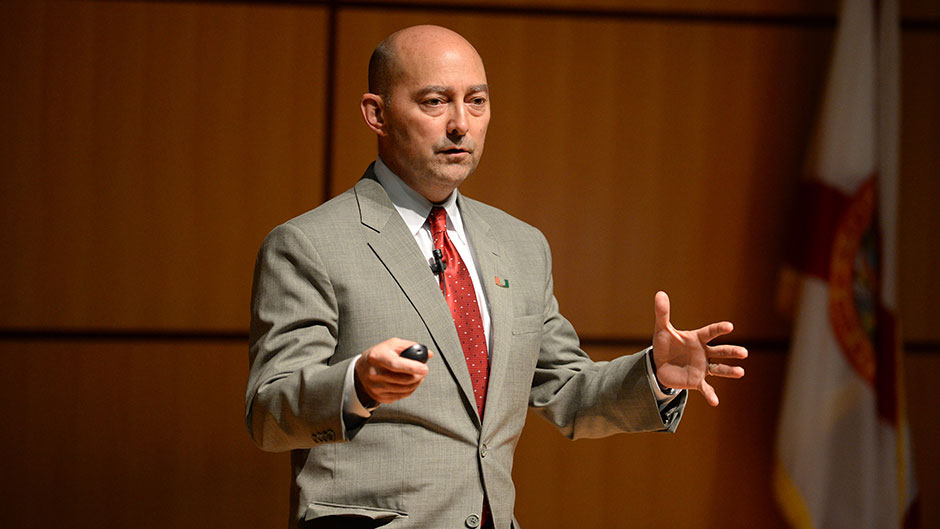One of the most powerful leaders of the 21st century, Ret. Admiral James G. Stavridis, the former Supreme Allied Commander at NATO, told a rapt audience at Storer Auditorium Thursday that building bridges, not walls, is the key to a secure world.
“In the 20th century, when we wanted security, we built walls: the Maginot Line, the Iron Curtain, the Bamboo Curtain, the Berlin Wall. It failed,” Stavridis, now dean of The Fletcher School of Law and Diplomacy at Tufts University, said Thursday evening. “Bridges are the key to security in the 21st century.”
Stavridis was invited to the University of Miami to deliver this year’s Cobb Leadership Lecture, a series former Ambassador Sue Cobb established in 1986 as a 50th birthday gift to her husband, UM Trustee Chuck Cobb, also a former ambassador. Stavridis is also the author of <i>The Accidental Admiral</i>, which was published in October and details his time as NATO’s Supreme Allied Commander, a post previously held only by generals.
He began his talk by cataloging the many challenges world leaders face today, chief among them, violent extremism. He noted that ISIS (the Islamic State in Iraq and Syria) now has an income of $2 million to $6 million a day, generated from selling looted antiquities, oil, human trafficking, and other crimes. Unlike previous violent extremists, ISIS is “a very sophisticated entrepreneurial enterprise,” he said.
He also cited cybercrime at every level, and the troublesome situations in Syria, the Ukraine, Iran, and North Korea. “North Korea has both weapons of mass destruction and the ability to deliver them far away. Like in Ghostbusters, those are two streams you do not want to cross,” he said.
Calling Asia “the dog that hasn’t barked” and a place that will continue growing in global importance, Stavridis noted that China and Japan now have a similar relationship to that of Germany and Austria in 1914.
Turning to the region around Florida, he said poverty and enormous inequality is the biggest challenge, leading the disenfranchised to gangs and spurring the cocaine industry, which finances corruption and violence and undermines democracy.
In the face of such seemingly daunting challenges, Stavridis succinctly summed up his advice for the next generation of leaders. “Listen,” he said. “So often we tend to leap into action before we listen, and listening matters in building bridges.”
He also offered the same advice he gives students at The Fletcher School: Use your time to “build intellectual capital. Use your time to learn,” he said. “Study languages. To know another language is to know another life. Read novels. They build intellectual capital of a different sort than what you get from reading non-fiction.”
Amid all the challenges, Stavridis also detailed opportunities. “The United States still has a profoundly important role to play,” he said. “We have a strong economy, strong military, expanding demographics and are on our way to energy independence. It will take leadership to continue playing that role.”
And it takes leadership to build coalitions, which he asserted, really matter. Unilateral actions often fail, but NATO and coalitions like the one in Afghanistan are important because, after all, they build bridges.
“We are great at launching missiles; we need to get better at launching ideas,” Stavridis said. “Our opponents are innovators. They wake up every morning looking for ways to improve their margin and do better. We need to take our good ideas as leaders and move them on social networks, not just in traditional ways. We need to collaborate. No one of us is as smart as all of us thinking together.”

